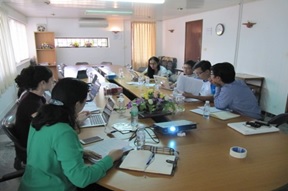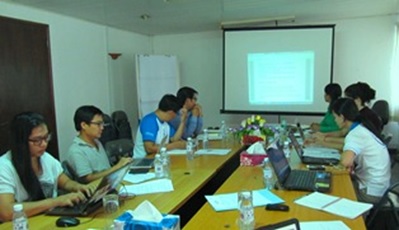 Cambodian
Cambodian English
English
The ICT4D Cambodia Network Continues to Rise
Open Institute : The ICT4D Cambodia Network is steadily taking form and swelling with momentum as various organizations work together to weave it. A third meeting of the network’s partner representatives ensued at the Open Institute offices on the 26th of May, 2015. The principle objective of the meeting was to identify a clear process for the development of the 5-year strategy plan for the network.
The member organizations felt it important to first identify these issues and then agree on the ones relevant to the project and to the different  organizations involved, while eliminating the ones that are not. The challenge areas the partners identified as crucial to the flourishing of ICT in Cambodia were as follows: education, the health sector, the media sector, human rights, and civil society/nongovernmental organizations. Having deciphered the issues, the process of classifying them into categories such as ICT for education, ICT for media, ICT for health, ICT for human rights, and ICT for CSO/NGO, will be simple.
organizations involved, while eliminating the ones that are not. The challenge areas the partners identified as crucial to the flourishing of ICT in Cambodia were as follows: education, the health sector, the media sector, human rights, and civil society/nongovernmental organizations. Having deciphered the issues, the process of classifying them into categories such as ICT for education, ICT for media, ICT for health, ICT for human rights, and ICT for CSO/NGO, will be simple.
The second issue on the table for review was that of identifying the activities or roles each stakeholder, partner organization and the relevant government institutions involved in the network. With the priority issues identified, (as mentioned above), the partners needed to divide up the issues and demarcate them between each other. Each organization chose a specific issue to focus on: the WMC elected to work with the media sector; the CCC elected to work with civil society organizations; the CCHR elected to work in human rights; OI elected to work with education, and finally, InSTEDD elected the health sector as its focus issue. Next on the agenda will be to learn about the issues in greater depth. This will require the partners to define their expectations, objectives and goals, their intended outcomes, as well as create a strategic approach and a plan for its implementation. The partners will also need to develop an analysis of the issue, a base of evidence and research of how it occurs at the national level, and a target group to focus on, as there is a deficit of information of these issues online. In the future, an IT tool of dissemination will be need to be created as well as an advocacy team.
Other emerging issues as the ICT4D Cambodia Network progresses, mentioned in the last partners meeting, were also briefly discussed. As the network advances, questions about expectations, goals and objectives will become increasingly important, and they are followed by other questions including identifying strengths, ways to improve, and weaknesses so as to nurture them into strengths, along with tailoring and improving the strategy plan. The disparity between men and women’s access to ICT, documentation, connectivity and internet access, online security and education about safe and effective internet usage are also recurring concerns.
The second order of business addressed in the meeting was identifying legal frameworks that support or are relevant to ICT. The partners named laws and created a list that will be further investigated. The list consists of: cybercrime laws, draft laws, telecommunication laws (for both NGOs and businesses), laws related to internet service provider companies, intellectual property and copyright laws, association laws (for NGOs), trade union laws, human rights and anti-trafficking laws, anti-corruption laws, confidentiality laws, and access to information laws.

The intention of naming and reviewing the laws is to decipher the laws that will create challenges for the project, as well as to identify the laws that will support the cause or assist in the implementation of the network. Along with that, the purposes of analyzing some of the aforementioned laws such as cybercrime laws, anti-corruption laws, and access to information laws are to assist the partners in developing an action plan that will focus on both the social and the ethical development of the Cambodian government and the citizenry. More specifically, it will address problems of social integrity and social accountability within governmental institutions and fuel a sense of collective responsibility among the Cambodian populace. In this way, the strategy plan will work at the sub-national (local communities) as well as the national levels.
Because working with the government to sustain development is one of the core visions of the network, paying attention to the government’s movements in this regard will prove quite useful. The success of the network will largely depend on how well different organizations and institutions within Cambodia cooperate and work in coalition. Some of the relevant work the government is doing that has popped up on the radar includes the National Strategy Development Plan (NSDP), the Development and Cooperation Partnerships Strategy (DCPS), discussions regarding agricultural lands, debates regarding investment, laws related to women’s empowerment and frameworks supporting it such as the NEARY RATARAK IV being coordinated by the Ministry of Women's Affairs.
The financial support of SPIDER has enabled the ICT4D network project to grow so much that in the coming future, the project will need a facilitator experienced and knowledgeable in ICT, beyond the capabilities of SPIDER. An expansion of the ICT4D project’s support system beyond Sweden will be in order, but for now the focus will remain internal, on the development challenges facing Cambodia. Nine participants attended this third meeting; they were representatives from: Open Development for Cambodia (ODC), Women Media Cambodia (WMC), InSTEDD Southeast Asia (InSTEDD), Cambodia Center for Human Rights (CCHR), The Cooperation Committee for Cambodia (CCC) and Open Institute (OI).
Category:
- Log in to post comments





